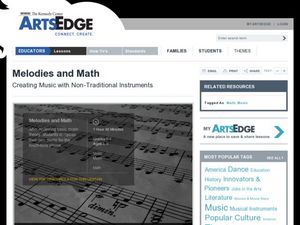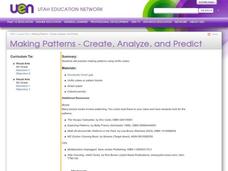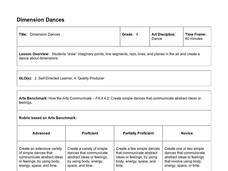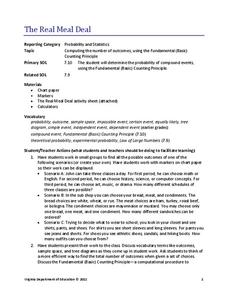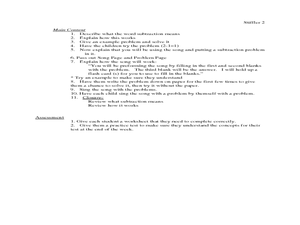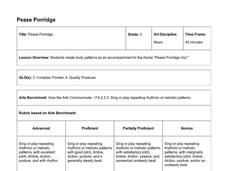Discovery Education
Mood Music!
Grouchy? Sad? Here's a great resource that shows kids how music can be used to lift their spirits. Kids collect and chart data on the effects of music on emotions. After analyzing the results of their experiment, they develop...
Curated OER
Comparing Values: Comparisons Between Musical Notation and Money
Students identify ways in which the principles and subject matter of other disciplines taught in school, specifically math, are interrelated with those of music.
Education Closet
Equal Rhythms
Engage young mathematicians in learning about fractions with this cross-curricular math and music lesson. After listening to and repeating different beat patterns, children realize that musical notes are just another way of representing...
Curated OER
Melodies and Math: Creating Music with Non-Traditional Instruments
Review the 4/4 and 2/4 time signatures in music with a helpful music theory lesson plan. Young musicians experiment with electronic sounds and create their own musical performance using instruments made from materials found in the...
Curated OER
Activity Guide for Snow
Create a cross-curricular learning experience around a shared reading of Cynthia Rylant's book Snow. From writing poetry and a singing a song about snow, to creating paper snowflakes and solving math story problems, this resource...
Curated OER
The Fibonacci Sequence Through Art Lessons
It is easy to combine math and arts lessons to create motivating and interesting activities.
Education Closet
West Side Shifts
Combine math, language arts, music, and dance with an activity focused on "America" from West Side Story. After listening to the song, learners compare the film to Romeo and Juliet, analyze the song's meter, design choreography, plan...
Curated OER
Exploring and Using Shapes to Make a Dance
Second graders use their bodies to create various shapes to make a dance when given various music and beats. In this shapes and dance lesson plan, 2nd graders create lines, curves, twists, and angles with their bodies.
University of Kansas
Newspaper in the Classroom
Newspapers aren't only for reading—they're for learning skills, too! A journalism unit provides three lessons each for primary, intermediate, and secondary grades. Lessons include objectives, materials, vocabulary, and procedure, and...
Curated OER
Dance Challenge: Calculate and Compare Speed by Measuring a Series of Dance Movements
Really neat! Kids choreograph a dance phrase and then measure the distance and speed of the phrase using a timer and a meter stick. They collect the data on a table which they use to determine an average. A series of observation and...
Curated OER
Clowning Around: Drawing
Kids create a clown out of shapes. They work to show emotions while practicing their drawing skills. Pupils use circles, triangles, squares, oil pastels, and their imagination to draw, color, and decorate a sad or happy clown. Tip: Have...
Curated OER
Making Patterns - Create, Analyze, and Predict
Fourth graders practice making patterns using Unifix cubes and identify, analyze, and determine rules for describing numerical patterns involving operations and nonnumerical growing patterns. They also find an example of a pattern in...
Curated OER
Creating Musical Notation
For this creative music activity from Scientific American, learners learn about musical notation and then design their own notations. Great web resource links are alsp provided
Hawaiʻi State Department of Education
Dimension Dances
Use dance to help learners conceptualize line segments, rays, lines, and planes. They choreograph dances that show dimensional space. Dancers start by pondering space, point, and lines as the teacher draws them in the air. Each...
Hawaiʻi State Department of Education
Angles on Kandinsky
Not only is Wassily Kandinsky fun to say, his art contains tons of angles. Learners discuss Kandinsky's music-inspired abstract art and four types of angles. They search one of his paintings for obtuse, right, straight, and acute angles,...
Virginia Department of Education
The Real Meal Deal
Burgers and salads and sodas, oh my! Scholars use a menu to investigate the Fundamental Counting Principle. They create tree diagrams to illustrate the number of possible choices for each given scenario.
Curated OER
Measuring Using Leaves
Students explore geometry by using non-standard measuring methods. In this length estimation lesson, students complete a worksheet in which different objects in their classroom are measured by three different sized leaves. Students draw...
Hawaiʻi State Department of Education
Rhythm Patterns
Fractions can be tricky. Why not have kids think of fractions like they think of eighth, quarter, and half notes? In teams, the class creates four-measure patterns with their percussion instruments. They need to explain their rhythm...
Hawaiʻi State Department of Education
Symmetrical Objects
In order to better understand how to locate a plane of symmetry in 3-dimensional objects, learners create a dance. The class reviews dance and math symmetry, then they practice making symmetrical shapes and movements with a partner....
Curated OER
Congruent Polygons: Copying Stretchy Shapes
Third graders investigate congruent polygons through dance. In this congruency lesson plan, 3rd graders do the "brain dance" as a warm up. They review polygon names by singing "The Polygon Chant," before mirroring congruent shapes with a...
Curated OER
Beginning Graphs in MS Excel
Students practice creating graphs in Microsoft Excel. In this technology lesson, students conduct a random survey and collect data. Students use the Microsoft Excel program to create a bar graph of the data.
Curated OER
Subtracting from Ten: Using Math with Music
Students explore basic math functions by singing with their classmates. In this addition and subtraction lesson, students sing the song "5 Green and Speckled Frogs"and complete a list of subtraction problems. Students complete a...
Curated OER
The Ants Go Marching
Integrate art, math, life science, music, and fun in this beginning addition and subtraction activity. Children kinesthetically represent adding and subtracting numbers to 10; they stand up one at a time as you count forward and sit down...
Hawaiʻi State Department of Education
Pease Porridge
Practice using different ways to express a single pattern. The class uses concrete, pictorial, and numerical modes to represent patterns found in a simple rhyme. They will move their bodies, use body percussion, draw, and use numbers to...



